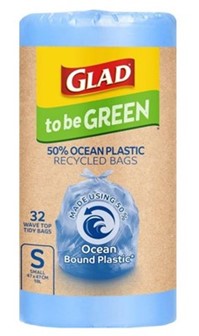In ACCC v Clorox Australia Pty Ltd [2025] FCA 357, the Federal Court has ordered Clorox Australia Pty Ltd (Clorox) to pay a total penalty of $8.25 million for making false or misleading representations that garbage bags from its ‘GLAD to be GREEN’ range were made from ‘50% ocean recycled plastic’. This case is the first time the ACCC has taken action in court against a business for greenwashing claims since announcing greenwashing as a compliance and enforcement priority for 2022/23.
Background
For a quick refresher on what greenwashing is and the ways it may constitute a breach of the Australian Consumer Law (ACL), see our article here.
When announcing the ACCC’s compliance and enforcement priorities for 2022/23, former ACCC Chair Rod Sims noted that consumers are increasingly interested in the environmental impact of the products and services they buy. Although consumers care about sustainability, they are usually not in a position to verify the accuracy of the environmental claims they encounter, so businesses that genuinely invest in sustainability may lose out to businesses making misleading claims. Given consumer sentiment about sustainability, the incentive for businesses to make environmental claims has never been stronger.
With that in mind, the ACCC has devoted significant resources to publishing guidance for businesses about greenwashing and monitoring environmental claims made by businesses in their marketing. At the end of 2023, the ACCC published a set of guidelines containing eight general principles for businesses to adhere to when making environmental claims. You can view our article on the guidelines here.
The ACCC’s case against Clorox
 Original packaging |
On 18 April 2024, the ACCC instituted proceedings against Clorox alleging that:
Clorox admitted to the contraventions alleged by the ACCC and the parties jointly sought relief in the form of declarations of contravention, a pecuniary penalty, an injunction under s 232 of the ACL, orders in relation to a compliance program and corrective advertising notice and an order for Clorox to contribute to the ACCC’s costs of the proceedings. |
||

|
What were the representations?In 2021, Clorox started selling a range of garbage bags branded ‘GLAD to be GREEN’, with prominent wording describing them as ‘made using 50% ocean plastic’ (Ocean Plastic Claim). In addition to this wording, there were various design elements that were intended to symbolise the environmentally friendly nature of the products, such as brown paper packaging, green and blue colours and a wave symbol. The ACCC alleged, and Clorox admitted, that by making the Ocean Plastic Claim, Clorox had represented that the GLAD to be GREEN bags were comprised of 50% recycled plastic waste collected from the ocean. In actual fact, each product was comprised of resin which was at least 50% derived from recycled plastic that had been collected from communities within up to 50 kilometres of the ocean or sea. The remainder of the product was comprised of non-plastic waste resin, processing aid and dye/ink. This case does not contain a detailed analysis of the misleading nature of the Ocean Plastic Claim because Clorox admitted to the contraventions of the ACL alleged by the ACCC, so there was no need for the parties to present arguments and the Court to rule on them. Nonetheless, we can still infer from the declarations made by the Court that the parties agreed the Ocean Plastic Claim was misleading in the following ways: |
| False representation conveyed by the Ocean Plastic Claim | True position |
| The recycled plastic used for the GLAD to be GREEN products was collected directly from the ocean. | The recycled plastic was collected from communities near the ocean with no formal recycling system, not directly from the ocean. |
| The actual composition of the bags was made from recycled plastic. | Recycled plastic was used as a manufacturing input to the resin that was used for the bags. |
“Made from” vs “made using”
While marketing claims that a product is ‘made from’ a certain percentage of recycled materials can convey a powerful message if the right evidence is there to back them up, this case demonstrates the need for caution when making such claims.
In the case against Clorox, the ACCC appears to have drawn a distinction between, on the one hand, a product being ‘made from’ recycled materials in the sense that recycled materials are part of its composition, and on the other hand, recycled materials being used as an input in the manufacturing process. While the court did not focus on the difference between the words ‘made from’ and ‘made using’ in its judgement, it is interesting to note how these terms may alter the perception of the composition of the products and whether this played any part in the court’s determination that the claims were misleading.
The court clarified that the claim that the bags were made from 50% recycled plastic waste collected from the ocean, was incorrect, stating that it was the resin used to make the bags which comprised 50% recycled plastic. While the distinction may appear subtle, in terms of adhering to Principle 1 of the ACCC’s Guidance, which requires sustainability representations to be accurate, it may be an important distinction to keep in mind.
The limited effectiveness of disclaimers
Under an asterisk, the packaging contained a disclaimer that the garbage bags were ‘made using 50% ocean bound plastic that is collected from communities with no formal waste management system within 50km of the shore line‘. In 2022, Clorox added the words ‘ocean bound plastic’ to the front of the packaging, as some members of Clorox’s senior management team had expressed concerns about potential of the Ocean Plastic Claim to mislead consumers.1
The ACCC and Clorox agreed that neither of these measures were enough to dispel the misleading impression conveyed by the Ocean Plastic Claim. This reflects the general principle that a representation can still be misleading even if asterisks are used to refer readers to more detailed qualifying statements, especially if the qualifying statements are in small print.2 The relevant question is whether the overall impression conveyed by the representation in its context is a misleading one.
Decision
The Court granted the declarations and injunction sought by the ACCC and ordered Clorox to pay an $8.25 million dollar penalty, implement an ACL compliance program at its own expense and publish a corrective notice on its website and social media channels. Clorox was also ordered to pay $200,000 towards the ACCC’s costs.
In determining the penalty, the Court noted that some of the contravening conduct by Clorox occurred before 10 November 2022, when the maximum penalty for a contravention by a corporation of sections 29 and 33 of the ACL was still only $10 million, rather than the current maximum of $50 million.
The Court noted some factors that mitigated the seriousness of the penalty that would otherwise have been imposed. For example, the contravening conduct was not in the most serious category of environmental misrepresentations, as Clorox genuinely believed the products would contribute to the reduction of plastic waste in the ocean and did not deliberately engage in a strategy to mislead consumers as to the composition of the products.3 Also, Clorox cooperated with the ACCC throughout the proceeding, including by voluntarily providing documents to assist the ACCC’s investigation and making admissions that it had contravened the ACL. Without these mitigating factors, it is likely that the Court would have imposed a higher penalty than $8.25 million.
The Court held that there is a particular societal harm that arises when conduct undermines consumers’ confidence in environmental claims. By making the Ocean Plastic Claim, Clorox deprived consumers of the opportunity to make informed purchasing decisions, particularly as the price of the GLAD to be GREEN bags was generally higher than the price of Clorox’s ordinary garbage bag products.4
Other ‘ocean plastic’ enforcement action
The case against Clorox is not the first time the ACCC has taken an interest in claims that a product is made from a certain percentage of ‘ocean plastic’. On 28 November 2023, the ACCC accepted an enforceable undertaking from MOO Premium Foods Pty Ltd (MOO) in which MOO accepted that it may have contravened the ACL by claiming that its yoghurt tubs were made from 100% ocean plastic. The ACCC’s investigation revealed that the plastic resin used in the manufacture of MOO’s yoghurt packaging was collected from coastal areas in Malaysia, and not directly from the ocean.
Important takeaways
The case against Clorox underscores the importance of Principle 3 of the ACCC’s guidelines for making environmental claims: do not hide or omit important information. If a disclaimer is buried in small print, or otherwise not displayed prominently enough compared to your headline claim, the overall impression may still be misleading. Asterisks should be used with caution, as in reality, many consumers are unlikely to pick up a product to read the details or conditions they refer to, particularly if the packaging of a product has already created an overall ‘green’ impression through symbols and colours.
The ACCC recommends only using asterisks only to provide supporting information, not to introduce disclaimers or qualifications that alter the main message.
How can we help?
We have a dedicated commercial and consumer law team that can assist you with review of marketing materials and provide related advice. Please contact us if you would like more information about the services we provide.
This article was written by Teresa Torcasio, Partner, Zoe Vise, Senior Associate and Monica Jones, Solicitor.
1 ACCC v Clorox Australia Pty Ltd [2025] FCA 357 (ACCC v Clorox), [90].
2ACCC v Telstra Corporation Limited [2004] FCA 987.
3ACCC v Clorox, [81]
4 Ibid, [78]-[79].

